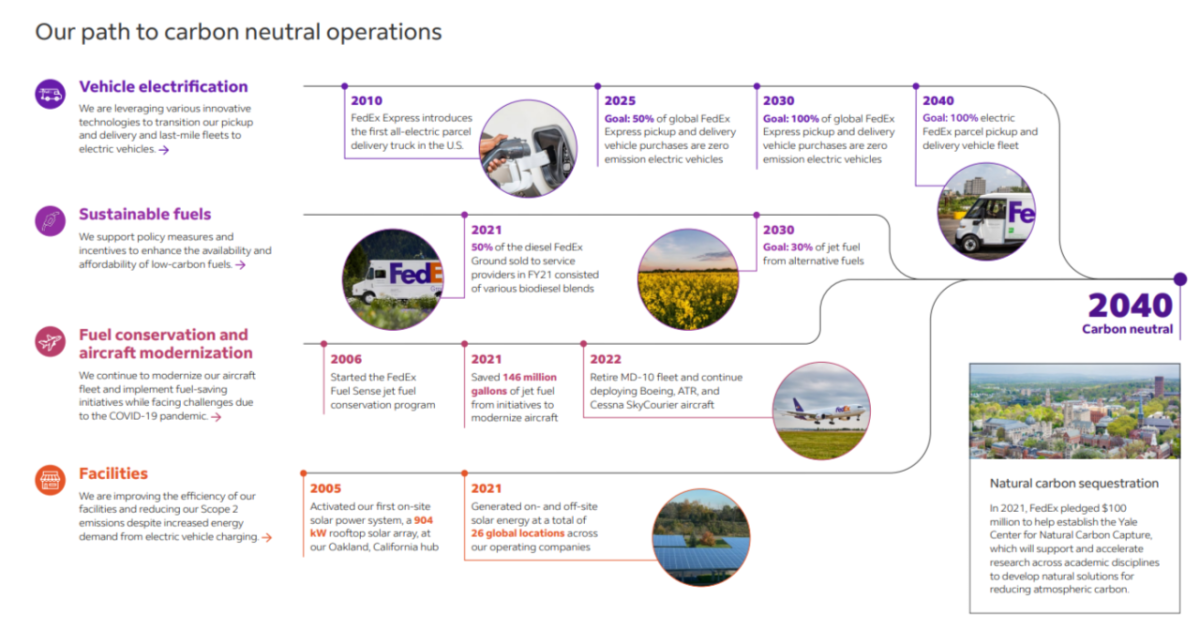Strategic Approach and Climate Change at FedEx
Originally published in FedEx's 2022 ESG Report
Strategic approach
At FedEx, we recognize that our business has an impact on the environment and we remain committed to minimizing these impacts. Our Practical Sustainability philosophy guides our sustainability strategy through the lens of our Reduce, Replace, Revolutionize approach.
Our Practical Sustainability philosophy highlights strategic and transformational stewardship that can lead to long-term success, innovation in products and operations, demand for solutions, and progress transparency. This philosophy, in alignment with our regularly conducted materiality assessments, directs our environmental strategy.
Throughout FedEx, our team members help guide our strategy by applying our Reduce, Replace, Revolutionize approach to current environmental initiatives.
REDUCE: Reduce or eliminate impacts from activities or operations
REPLACE: Use the right solutions in the right applications
REVOLUTIONIZE: Discover and utilize the technologies and solutions of tomorrow, today
Our efforts aim to mitigate environmental impacts, increase efficiency, reduce costs, and protect against future risks. By implementing our Practical Sustainability philosophy and our Reduce, Replace, Revolutionize approach, we bring value to our organization and our stakeholders while making strategic progress against our goals.
Around the world, FedEx is also working with the logistics industry and with the communities we serve to move goods more sustainably and design cities for a better future. We collaborate with non-profit organizations that provide innovative solutions to reduce the carbon footprint of the transportation industry through the Sustainable Logistics pillar of our FedEx Cares program.
Climate change
FedEx understands the impacts climate change poses to our business, such as intensifying weather events, emerging GHG emissions regulations, increased media and investor attention, and enhanced customer demands to address environmental challenges. While climate change poses strategic risks to our business and our stakeholders, it also presents opportunities as we advance our sustainability strategy.
We identify and evaluate physical and transition climate-related risks through our ERM process and align our assessment and reporting approach with the recommendations from SASB and TCFD. This approach allows us to manage our risks while evaluating our progress towards our sustainability-related goals.
Carbon neutral operations
In March 2021, we announced our ambitious goal to achieve carbon neutral operations by 2040 across our global operations’ Scope 1 and 2 emissions and our Scope 3 contracted transportation GHG emissions. To meet this goal, we are investing more than $2 billion over the next several years to support bold action in three key areas: vehicle electrification, sustainable energy, and carbon sequestration. In addition, we continue to leverage other approaches to reduce vehicle emissions, such as increased intermodal rail usage at FedEx Ground and FedEx Freight, which avoided nearly 600,000 metric tons of carbon dioxide equivalent (CO2e) in FY21 alone. Thanks to our ongoing collective emissions reduction efforts, we decreased carbon dioxide (CO2) emissions intensity—on a revenue basis— by 45% from FY09 through FY21, a period when our average daily package volumes grew by 180%. Additionally, we are continuing to invest in initiatives such as the successful FedEx Fuel Sense program, aircraft fleet modernization, and alternative fuels to avoid aircraft emissions.
To help achieve carbon neutral operations, we have a goal to transition the entire FedEx parcel pickup and delivery (PUD) fleet to zero emission vehicles by 2040 through a phased approach. By 2025, we intend that 50% of FedEx Express PUD fleet purchases will be electric, increasing to 100% of all purchases by 2030.
We are accelerating our sustainable energy plan within our facilities worldwide through energy efficiency, renewable energy, and other energy management programs. Our Energy SIT is focused on developing a strategy to achieve zero Scope 2 emissions by 2040, even though we anticipate that our facility electricity use will increase as we transition to electric vehicles.
Our path toward carbon neutral operations also requires new strategies for removing and storing Earth’s excess carbon. In 2021, we pledged $100 million to help establish the Yale Center for Natural Carbon Capture. This commitment encourages interdisciplinary research to create natural solutions for sequestering CO2 from the atmosphere. Development of these solutions falls into three major categories: biological, geological, and industrial. The Center’s initial target is to help offset GHG emissions equivalent to current airline emissions—approximately one gigaton per year—through short-term, mediumterm, and ongoing research. Once these methods are proven, the Center will broaden its scope to address additional global sources of emissions to accelerate the adoption and implementation of natural carbon capture solutions around the world.
In April 2021 we issued the first sustainability bond by a North American transportation and logistics company to further our commitment to carbon neutrality. Our 2021 sustainability bond framework aligned with the components of the Green Bond Principles, the Social Bond Principles, and the Sustainability Bond Guidelines, and we intend to follow these principles and guidelines for any subsequent sustainability bond offerings.




